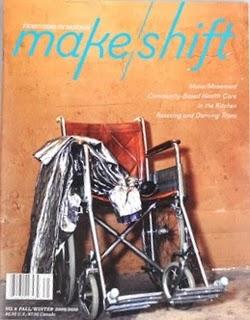make/shift: feminisms in motion (Issue 6)

Make/Shift aims to thrust the ignored populations into the greater recognition. Native Americans living in urban settings rather than rural reservations tend to be invisible in our nation’s consciousness. Society shies away from the combination of disability and sexuality, and when it comes to women’s prisons, many question the validity of empowerment through peer education health programs. The Fall/Winter edition of Make/Shift explores these and a wide variety of other social issues. It highlights individuals working to improve the world on personal, local, international, and virtual levels through social action or artistic ventures.
A letter from the editors tells readers that the theme of the issue is movement, but some of the articles that follow move more efficiently than others. A few of the more personal pieces struck this reader at a trifle tedious. A piece about losing one’s ethnic identity by using a certain hair product makes about as much sense to me as the belief that using spray-on tanner would force me to concede my Whiteness. An article entitled “Vocabulary Lesson” questions the queer world’s borrowing of the word wife from mainstream society when that word has many negative historical connotations attached to it, but the execution came off condescending, and seemed to push for the continued separation of the two groups.
Many stories move quite fluidly, however. A tale about a formerly battered woman’s journey into professorship hits the mark, as does a story about a Haitian lesbian’s encounter with a skinhead on a train. A collage piece on kitchens examines how this politically charged space changes depending on the occupants and attitudes. A series of segments on health focus on specific issues concerning women’s health, such as environmental hazards connected with work traditionally performed by females.
Another focuses on the push to provide health care for transpeople. As a health care provider featured in the article puts it, “If someone has a cervix, they need gynecological care,” yet many trans people harbor fears of discrimination and simply discomfort with entering a clinic. A piece on immigration explores how the nation’s policies affect those in the queer community.
The magazine doesn’t focus long on any one issue or demographic. Make/Shift strives to reach out to all who identify as female, no matter what their origin or back story, and there is a tidbit for everyone—hopefully more, if you’re willing to learn something.
The design would benefit from more art and photographs to further connect readers to the subjects of the articles. This shouldn’t be difficult, considering that this is a magazine that celebrates artists. I don’t know if the lack of image distribution is a reflection of the magazine’s relative newness, a lack of resources, or failure to see the need, but either way, the need is evident.